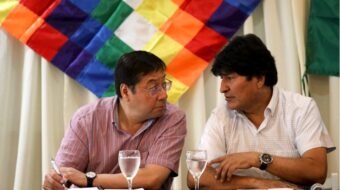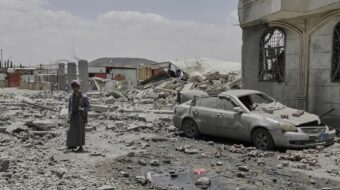Syria: U.S. raid kills 8
At a London press conference Oct. 27, Syria’s foreign minister Walid al-Moallem condemned a cross-border raid by four U.S. helicopters the previous day that killed at least eight civilians and wounded at least seven more. Al-Moallem called the raid an act of “criminal and terrorist aggression,” and said Syria would defend itself “if they do it again.”
The United States claimed the strike killed a leading al-Qaeda operative. But witnesses said it killed construction workers on a farm five miles from the Iraq border. Witnesses said two of the helicopters landed and troops emerged, firing.
Some U.S. observers saw a link between the raid and the U.S. presidential elections. On his blog, Informed Comment, University of Michigan professor Juan Cole said he thinks that besides any military objective, the Bush administration’s raids into Syria and Pakistan are intended to help the Republicans in some way in the election.
Meanwhile, Pakistani officials said a missile fired from a U.S. drone aircraft Oct. 27 killed up to 20 people in the border region of Waziristan. U.S. and CIA military drones fly regular patrols over areas bordering Afghanistan, and reportedly carried out over a dozen air strikes in recent months. Since a Sept. 3 helicopter raid killed over 20 Pakistanis including several civilians, sparking Pakistani protests, the U.S. has stepped up the use of drones, launching 18 such attacks in the last three months.
Congo: Rebels take over gorilla refuge
Armed rebels led by renegade army Gen. Laurent Nkunda this week occupied the headquarters of Virunga National Park, Africa’s oldest national park and home to most of the world’s remaining mountain gorillas. Over 50 park rangers were reported fleeing through the forest to the provincial capital, Goma, itself under rebel attack in the ongoing civil war in the Democratic Republic of the Congo.
Hundreds of Congolese soldiers were retreating Oct. 27 ahead of Nkunda’s latest push toward Goma in defiance of the UN Security Council’s demand that he respect the cease-fire the world organization negotiated in January. Last December UN peacekeepers defended Goma by firing on the rebels from attack helicopters; they were reported taking similar action this week.
China: Premier says restructure world finance system
Addressing the closing session of the Asia-Europe meeting in Beijing Oct. 25, Premier Wen Jiabao called for new rules for the international finance system.
Wen’s proposals included increased participation of developing countries in international financial organizations, stronger supervision of the international financial system and building a financial assistance system, China Daily said.
Wen told reporters after the summit of leaders and representatives from 45 Asian and European nations and organizations that while the financial crisis has had its effects, China had adjusted its economic policies as early as June. He expressed confidence his country would “continue its stable and relatively rapid development.”
China is slated to participate in a Nov. 15 summit that will bring together leaders from 20 industrialized and developing countries in Washington, D.C.
Poland: Crisis slows economy
“Welcome to tough times,” the daily newspaper Dziennik told its readers last week, as Poland’s currency, the zloty, dropped 17 percent last week against the dollar, and over 10 percent against the euro. Building projects ground to a halt as credit froze up, and the leading stock index dropped 12.6 percent in a week. It has lost half its value this year.
Though Poland’s economy had appeared strong, now “Everything is going down,” information technology consultant Lukasz Tync told The New York Times in Warsaw last week.
Other former socialist countries in Eastern Europe are even harder pressed. Hungary and Ukraine have just concluded tentative loan pacts with the International Monetary Fund, notorious for requiring borrowers to stifle public programs in favor of private economic development.
Cuba: Cooperation resumed with EU
A leading European Union official last week held meetings with top Cuban leaders during an official visit which ended with an agreement resuming bilateral cooperation.
EU Commissioner for Development and Humanitarian Aid Louis Michel met with Cuban President Raul Castro and Foreign Minister Felipe Perez Roque during his stay.
Under pressure from the Bush administration, the EU had initiated sanctions against Cuba in 2003. The sanctions were suspended two years later and were totally lifted at the EU summit last June.
Michel and other EU officials visited Cuba’s hurricane-devastated regions during their visit. The EU will provide $2.6 million in emergency aid and starting next year, over $70 million more in assistance to rebuild schools and damaged homes.
This week’s World Notes were compiled by Marilyn Bechtel, mbechtel@pww.org.









